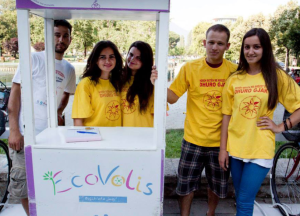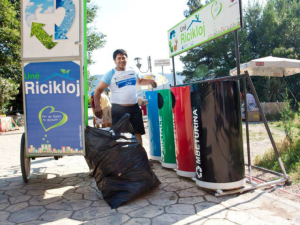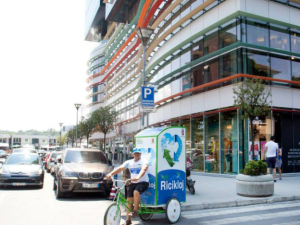by Joseph Matar
Fall 2013 InGear
Pedals for Progress’ partnership with the Social Stimulating Alternative Programs (SSAP) in Albania has led to the founding of a number of initiatives that have not only bettered people’s lives, but the country’s environment as well. The first of these was the Ecovolis bike-sharing system—based in the country’s capital of Tirana—which helps to circulate donated bicycles throughout Albania. An extension of this system, the Ecovolis Service, has built up a countrywide reputation for its reliability in the repair and maintenance of bikes.

There is also the Eco Bicycle Shop, the biggest bicycle shop in Albania. In under two years, the shop has repaired, sold, and put around 2000 bikes back on the streets of Tirana, as well as other urban and rural areas. Furthermore, the shop provides training on the repairing and selling of P4P-donated bicycles to young people, thereby preparing them for employment.
One of the major goals of the SSAP is to provide jobs for members of communities in need and, so far, the SSAP has employed approximately 50 people, many of whom are students, to assist in the operation of its various services. Aside from repairing and selling bikes, 10 students earn money riding advertisement-toting bikes around for SSAP’s newest venture, Green Advertising. These used bikes have been modified to function as mobile advertisements for companies who have embraced this new, economical, and environmentally-friendly method of advertising.

Another of the SSAP’s most recent projects that seeks to improve environmental conditions in Albania’s capital is called “I Recycle.” Typically, a method of survival for the hundreds of struggling families of the Roma community is to search through public garbage bins in order to find and collect paper, plastic, and aluminum. They then take this recyclable waste to be exchanged for a very low profit. Commonly, this process means that much of the unrecyclable waste is removed from the bins and left to scatter about the streets.
The Roma people need bicycles to transport the goods they collect as well as to efficiently check all the bins in a given area. To accomplish this, they either share a bike, using it in shifts, or, unfortunately, resort to stealing bicycles from the Ecovolis bike-sharing system. Those unable to procure a bicycle instead opt to search the tons of garbage disposed of daily in landfills. Frequently, this job is left to the Roma children, who chase the garbage trucks as soon as they are spotted, in an effort to be the first to get a chance find recyclables in the trash. Perhaps it goes without saying that these children are not attending school.
In response to these problems, the SSAP came up with “I Recycle,” a multi-part, long-term solution. First, over 100 bicycles were donated to the Roma community in Tirana, markedly reducing the number of bicycle thefts as well as moving toward eliminating the need for children to chase garbage trucks and make visits to landfills. Second, to put an end to all of the digging around in bins and to reduce the amount of litter on the streets, the SSAP manufactured and distributed color-coded garbage bin structures around Tirana. Each of the structures is divided into four bins: one for paper, one for plastic, one for aluminum, and one for other waste. With their new bicycles and the recyclables now already properly divided up, the Roma people can make their collections more quickly and simply, thus increasing their incomes.
The eventual goal, however, is to systemize this practice and provide the Roma people with long-term occupations. Working with the municipality of Tirana, the SSAP has begun this process by employing the Roma and providing them with cargo bicycles specifically constructed for the collection and transport of recyclable materials. The money collected from exchanging these recyclables is then put toward the employees’ salaries and the maintenance of their bicycles. Only adults are employed as the SSAP strictly forbids the use of child labor. In adopting this system, Tirana is gradually becoming one of the first cities worldwide that has a recycling process based entirely on bicycle transport, helping to reduce the need for and pollution from huge garbage trucks.

Sinan and Neritan were the first of the Roma community to become employees in the “I Recycle” program. Previously, their families would scrounge through landfill garbage, ultimately not earning even half of what Sinan and Neritan earn now. It gives them great pride to be able to begin new lives for their families and to be a part of the cause toward making Tirana a cleaner city. Furthermore, with the SSAP taking a strong stance against child labor, a condition of this employment is that the children of families with employees in the SSAP begin attending school. It is clearly fundamentally wrong for a childhood to be spent scavenging in landfills. This problem is increasingly being phased out as Sinan, Neritan, and other members of the Roma community can now provide their sons, daughters, sisters, and brothers with the educations they deserve.
None of this would have been possible without the donations of used bicycles from the American people that have been shipped to Albania by Pedals for Progress for over three years. The partnership between P4P and the Social Stimulating Alternative Programs was originally begun in 2010 with the goal of reintroducing bicycles to an automobile-centric society in order to decrease pollution and provide citizens with a healthy transportation alternative. However, this initial goal has been greatly expanded upon with bicycles being distributed throughout rural and urban areas, providing assistance to those in need. Companies are even finding the bikes to be useful as vehicles for advertising. Moreover, formerly a completely non-recycling community, the capital city of Tirana is making great strides toward accepting and adapting to the “I Recycle” system. In doing so, living conditions have improved and previously needy people have found employment.
The progress is encouraging and has fostered interest from other needy communities in Albania. However, in order to spread the “I Recycle” project and create more jobs countrywide, contributions and bicycle donations remain as vital as ever. With every bicycle donated, there is the potential for more successes—like those of Sinan and Neritan—in Albania. Every bicycle means one more opportunity to liberate a child from days spent fruitlessly scouring landfills for a few recyclable goods to instead give them a proper education and hope for a better life.
